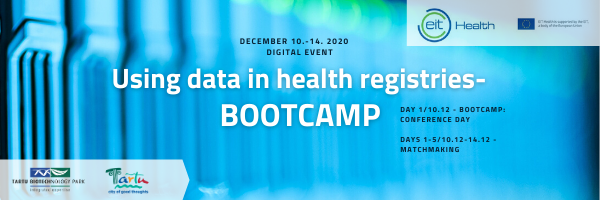Public Health Data bootcamp 10-14 December
The Bootcamp will cover introduction from biobanks and health data registries about what data can be made available and how to access this. The startups and SMEs are encouraged to present their product or service and propose questions to biobanks and health data registries.
Registration info:
Register HERE
Register HERE
General Agenda (all times are CET):
Day 1 (10.12.20)
10:00-10:10 – Start of the day, overview of the main organizing institutions
10:10-10.40 – Visionary keynote – Using health data for business / Lars Linsköld Med.Dr. (Portfolio manager, Sweper/ Swelife, Senior advisor AI.se, Regional developer Officier healthcare digitalization, Region Västra Götaland)
10.40-12:00 – Introductions from Health registries & Biobanks:
- Estonian Biobank (EE) /Neeme Tõnisson, MD, PhD (Estonian Biobank, University of Tartu; Tartu University Hospital)
- Lifelines biobank (NL) / Ilse Broeders, MSc (Project manager Research office Lifelines Data and Biobank, The Netherlands)
- SCAPIS (SE)
- Biobank West (SE) /Kristina Lind & Elin Stenfeldt, MSc (Biobank West, Sahlgrenska University Hospital)
12:00-13:00 – Lunch
13:00-14.00 – Panel – Success stories of collaboration between SMEs and health data registries (followed by the open discussion, chance to pitch the main questions, concerns and needs regarding the topic).
Panelists:
Jaak Sarv, MSc, Software Engineering from University of Tartu
Jaak has 20 years of experience in software development and data science. He founded Geneto to solve his personal problem of being overweight. After successfully solving his own problem he is helping others to follow his steps. He sees a huge potential how preventing lifestyle diseases could help millions of people in the world and reduce burden for the medical system. As a data scientist he envisions how gathering daily lifestyle data together with genetics could lead to new better scientific discoveries in genetics.
Geneto is a personal medicine company that helps people to lose weight and avoid lifestyle diseases. We do this by combining the latest scientific discoveries in the field of genetics with diet and fitness app. We make genetic testing practical by giving daily actionable advice to our customers. We are using polygenic risk scores that we have developed together with Estonian Genome Center.
Neeme Tõnisson, MD, PhD, Group Leader at Estonian Biobank, University of Tartu, Clinical Geneticist in Tartu University Hospital
Sven Parkel, PhD, Secretary General at ScanBalt, General Manager at Tartu Biotechnology Park
Emil Syundyukov – computer scientist dedicated to problem-solving in Healthcare and Education. Emil has 8 years of experience in applied research, combining competence in Computer Science with applications in Healthcare. In parallel with academic experience, previously co-founded and worked in multiple Startup ventures, and for the last 2 years is a CTO of Longenesis, uniting medical specialists and computer scientists, working with the industry leaders towards accelerating the collaborative research withing the biomedical ecosystem worldwide.
Sachin Gaur (moderator), Director Operations, InnovatioCuris, is a researcher cum entrepreneur in space of mobile and Internet solutions. He was in top 10 innovators in India under India Innovates Growth Programme 2013 by FICCI. He is involved in multiple ventures in the domain of digital marketing, mobile solutions and the Internet of Things.
He has a double M.Sc.(tech) in Mobile Security and Cryptography from Aalto University, Finland and University of Tartu, Estonia. He has worked in past with organizations like Adobe, C.E.R.N. and in research at the Aalto University in security-related topics.
Also, he has a dozen patents issued/pending in USPTO apart from contributing book chapters in two books on topics of Innovation and Healthcare.
Days 1-5 (10.12.20-14.12.20)
Matchmaking in the B2meets platform
Participating Biobanks
1. Estonian Biobank
The Estonian Biobank (EBB) is a population-based biobank of the Estonian Genome Center at the University of Tartu (EGCUT. Its cohort size is currently close to 200,000 participants (“gene donors” ≥ 18 years of age), which closely reflects the age, sex and geographical distribution of the Estonian population. Estonians represent 83%, Russians 14%, and other nationalities 3% of all participants. Genomic GWAS analyses have been performed on all gene donors, and RNA samples from 2,100 individuals are available for gene expression studies, along with 45 biomarkers from serum and plasma.
2. Lifelines biobank (Netherlands)
Lifelines is a large, multi-generational, prospective cohort study that includes over 167,000 participants (10%) from the northern population of the Netherlands. Through the length, size and in-depth examination we provide many excellent opportunities for studies worldwide unraveling the etiology of multifactorial diseases focusing on multifactor risk factors. Our aim is to enable research to better prevent, predict, diagnose and treat diseases. This is why we generate large amounts of data for the purpose of research on complex interactions between the environmental, phenotypic and genomic factors involved in the development of (chronic) diseases. A unique feature is the possibility for researchers to collect additional data or biomaterials by recalling participants and to analyse these in combination with general Lifelines data and samples.
3. Swedish CardioPulmonary Bioimage Study – SCAPIS
The aim of the Swedish CArdioPulmonary bioImage Study (SCAPIS) is to predict and prevent cardiovascular disease (CVD) and chronic obstructive pulmonary disease (COPD). The goal is to further develop individualised treatment and improve health care by building a nationwide, open-access, population-based cohort.
SCAPIS is a unique study that has recruited and investigated 30,000 men and women aged 50 to 64 years with detailed imaging and functional analyses of the cardiovascular and pulmonary systems.
Main funder of SCAPIS is the Swedish Heart-Lung Foundation and with considerable support from Knut and Alice Wallenbergs Foundation, Vinnova, The Swedish Research Council and the participating Universities and University Hospitals.
4. Biobank West (Sweden)
Biobank West can assist researchers with collection, handling, storage and traceability of biobank samples. The biobank is operated by Region Västra Götaland in collaboration with the University of Gothenburg’s Core Facilities. The biobank operates using a quality-assured, standardized process, which means all samples are handled similarly. Biobank West also participates in Biobank Sweden, the national research infrastructure that, among other things, facilitates collaboration in multicenter studies through increased harmonization with national and international guidelines.


